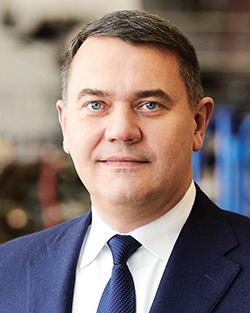
Zilvinas Lapinskas, CEO of FL Technics.
CEO Zilvinas Lapinskas discusses the Lithuanian MRO’s recent hangar announcements.
What was the thinking behind FL Technics’ recent announcement that it would establish an MRO facility in the Dominican Republic?
We did this with the whole Americas region in mind: the U.S., Canada, Central America and the Caribbean. We were thinking about the trends, where this maintenance is moving from the high-cost countries to lower-cost countries. We had the same experience when maintenance moved from Western Europe to Eastern Europe, where companies moved to the lower-cost locations for their maintenance.
We’ve seen some Central American providers who have the benefit of lower-cost maintenance attracting more customers from the U.S. When we started to compare the cost in Central America with the U.S. and the time of ferry flights from the U.S. to the region, we made the decision to set up our hangar somewhere in that region. FL Technics will be able to serve regional demand while being able to do so with a cost advantage. After looking at different locations, we decided on the Dominican Republic and specifically Punta Cana Airport.
Will FL Technics look to build and own the hangar or lease from Punta Cana Airport?
The arrangement will see the airport build the hangar for us, and FL Technics will then lease the facility from them. Once it becomes operational in 2025, it will begin with five bays of maintenance, but with the ability to eventually expand by another seven and take the total number of bays to 12.
What is FL Technics anticipating in relation to workforce recruitment in the Americas? Will the Dominican Republic facility look to a domestic or expatriate workforce?
It will be a mix. We will be the first base maintenance MRO in the Dominican Republic, as there isn’t a lot there apart from a few line maintenance providers. Naturally, that means there will be a shortage of local certified staff. The anticipation is that between 250 and 300 engineers will be needed to work across the five maintenance bays. At the beginning, we will need expatriates while focusing on the training of local people, which we are discussing currently with local universities. There is a two-year window to get the right people in. Building the hangar won’t be the problem, but getting the right people inside and creating a reliable production system and guaranteeing a good turnaround time for the customer will be.
Were similar principles applied to the announcement of a new maintenance hangar in Bali, Indonesia?
There are similarities but also differences. In Jakarta, FL Technics has operated an MRO hangar since 2015 at Soekarno-Hatta International Airport. There we have three maintenance bays in total, and that is small. That hangar lease runs until 2025, and we expect to extend that. However, given the high volumes of demand from the Asia-Pacific market—especially from leasing customers—we see an opportunity to provide even more services.
Initially we looked at expanding in Jakarta, but for many reasons there wasn’t enough capacity at the site for us to grow. Instead we were offered a hangar in Bali, which, like in the Dominican Republic, will be built for us to rent. In Bali, there are two small existing hangars which we will take over shortly and start some operations before the building of four additional bays, eventually taking it to six bays in total.
In Bali, we are specifically targeting the Australia market. Geographically it’s not far away, and many Australians holiday in Bali, meaning a high volume of flights, so that means the carrier doesn’t have to do their ferry flights and can just arrive with the passengers before replacing their aircraft. The pricing we can offer in Bali compared to Australia is also attractive, as it is cheaper.
Was FL Technics impacted by the outbreak of the nearby Russia-Ukraine war, and how did it readjust its business to deal with this?
Before the war started, the largest business we had in Russia and the Commonwealth of Independent States countries was in spare parts trading. When the war started, we stopped all operations immediately and we moved all people dealing with that market to other regions over the course of two months. They instead moved into our Asia-Pacific team and our Dubai office that serves the Middle East, and helped grow our focus on Africa. By the end of April 2022, we were back within budget lines. In the longer term, this move has resulted in greater revenue than we were getting from Russia.





